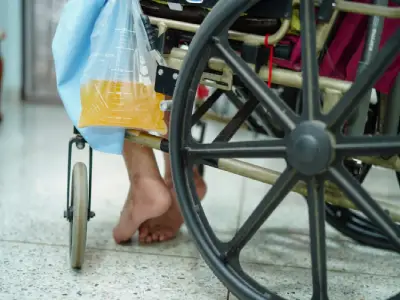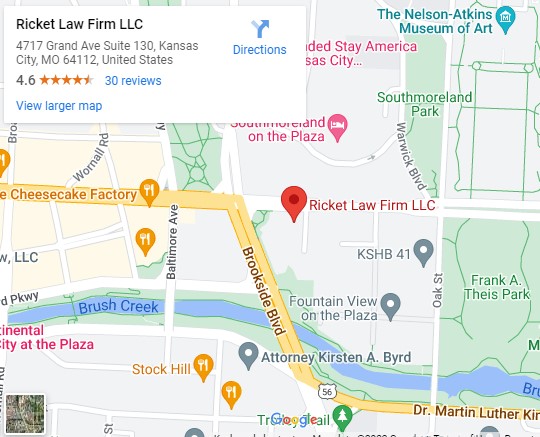Kansas City Untreated Infections Lawyers
UTIs are common in skilled nursing and assisted living facilities. But can UTIs be avoided in nursing homes? The short answer is that some are, and others are not. Liability often arises when a nursing home ignores a patient’s UTI and allows the infection to progress to sepsis. Preventable UTIs are a common cause of nursing home wrongful death lawsuits.
Our knowledgeable Kansas City untreated infections lawyers can answer your questions about UTI leading to sepsis caused by nursing home negligence. If you believe your loved one suffered a preventable UTI in a nursing home, which resulted in wrongful death or serious injury, contact Ricket Law Firm.
We have the knowledge to assist your family after a preventable urinary tract infection injury has harmed a loved one. Call us immediately to assist you in fighting for your legal rights.
Why Do I Need Kansas City Untreated Infections Lawyers?
A nursing home is great for elderly people who need around-the-clock care. However, what happens when that care is not up to par? Nursing home residents are often susceptible to untreated infections, which can lead to serious health problems or even death.
If you have a loved one in a nursing home and believe they have contracted an untreated infection, immediately consult with one of our untreated infection lawyers. There are several reasons why you may need the help of our lawyers in this situation:
To Ensure That Your Loved One Receives the Proper Medical Treatment
If your loved one has contracted an infection, they will need prompt and proper medical treatment to recover. Our skilled Kansas City untreated infections lawyers can help ensure your loved one receives the care they need.
To Hold the Nursing Home Accountable
Nursing homes must provide a certain level of care to their residents. If they fail to do so and your loved one is injured. As a result, you may be able to hold the nursing home accountable by filing a lawsuit. We can help you determine if you have a case against the nursing home and, if so, guide you through filing a lawsuit.
To Get Compensation for Your Loved One
If your loved one has been injured by an untreated UTI leading to sepsis, they may be entitled to compensation. Our qualified Kansas City untreated infections lawyers can help you recover damages such as medical expenses, pain and suffering, and more.
Why is UTI Prevalent in Nursing Homes?
A UTI, or urinary tract infection, is an infection of the urethra, ureter, bladder, or catheter. UTIs are common among elderly nursing home residents, especially catheterized patients. However, the fact that a nursing home resident is catheterized does not absolve the nursing home of liability if the patient dies due to a urinary tract infection.
It is most common in women, but aging adults experience more UTIs, with the National Institutes of Health reporting that up to 30% of women over 85 had a UTI in the previous 12 months. Urinary tract bacterial infection is more likely in nursing homes due to several risk factors, including:
- Using a catheter
- Co-existing medical conditions that can mask or exacerbate UTI symptoms
- Increased prevalence of cognitive illnesses, such as dementia, which can cause confusion or difficulty explaining symptoms
- Aging-related immune system deterioration
What Are the Common Causes of UTIs in Nursing Home Residents?
 There are many different types of UTIs, but the cause is always the same: bacteria entering and infecting the urinary tract system. The urethra is the most common entry point.
There are many different types of UTIs, but the cause is always the same: bacteria entering and infecting the urinary tract system. The urethra is the most common entry point.
Many urinary problems in the elderly are caused by dehydration. Older adults drink less because they know bathroom difficulties or are afraid of incontinence. As a result, the urine becomes more concentrated and bacterially rich. In older women, estrogen deficiency affects the protective bacterial colonization of the vagina.
Aging men have prostate problems, which cause urine retention and bacteria entrapment. Nursing home staff who are careless with catheters are a common source of UTI leading to sepsis in the elderly. On the other hand, a diligent staff educated in catheter safety can make a significant difference in reducing UTI cases.
What Are the Typical Symptoms of a UTI?
Urinary tract infections are more common in women but can affect anyone. A UTI is characterized by burning during urination, pain in the lower abdomen or groin area, and a strong desire to pee. If you have these symptoms for more than two days, you should immediately see a doctor.
Other UTI symptoms in nursing home residents include:
- Chills and fever
- Urinating causes burning or pain
- Cloudy urine
- Increased urination
- Urine that smells strongly
- Urine that is darker in color and resembles coffee, tea, or cola
- Nausea and vomiting
- Urine residue (possible lower UTI)
- Backache in the lower back
- Headache
- Suprapubic pain
- Incontinence that is new or worsening
- Positive urine culture
- Urinary retention in patients with indwelling urinary catheters
If your loved one exhibits any symptom of UTI, you should immediately seek medical attention. If their infection was caused by neglect in the nursing home, you should consult our experienced attorneys to see what possible actions you can take.
What Are the Possible Complications Related to UTI?
UTIs are fairly common at any age and are easily treated with antibiotics. Whether due to nursing home negligence or ignorance, failure to treat a UTI can have long-term consequences. Almost any infection can eventually lead to sepsis.
Sepsis, also known as “blood poisoning,” occurs when the body releases chemicals into the bloodstream to combat an infection. This chemical flood disrupts the body and can harm multiple organs. Following sepsis, septic shock occurs, resulting in a dangerous drop in blood pressure. In worst-case scenarios, severe sepsis can lead to death.
UTIs can also cause kidney infection and long-term damage in an older patient. Untreated infections can also cause a lifetime of recurrent UTIs (two or more in six months).
Why File a Lawsuit for an Untreated Nursing Home Infection?
Filing a claim on behalf of a victim who has suffered from a nursing home-acquired infection is one way to ensure that person receives justice. These facilities care for our elderly and get large sums of taxpayer money through Medicare. They must follow tight laws to give good care.
If a nursing home fails to uphold its responsibility to follow the rules, it causes sickness and suffering that could have been avoided. This is the time to take action. The civil justice system includes measures that allow you to seek restitution through a lawsuit. The money you stand to gain will not alleviate your loved one’s pain or bring them back if they have died.
Nonetheless, the action you take may discourage the irresponsible facility from ignoring its responsibilities in the future.
What Are the Recoverable Damages Caused by Nursing Home Infections?
Residents at nursing homes are typically elderly or disabled. They may be fragile and incapable of fighting even a normal cold. In these populations, benign ailments are frequently more severe. Victims and their families may be able to seek compensation from the nursing home and its staff with the assistance of our skilled Kansas City untreated infections lawyers.
Economic Damages
Economic damages are those that are directly related to money loss. This can involve hospital bills, medicines, and therapies for a nursing home infection. If the infection causes death, these damages may also cover burial expenses.
Non-economic Damages
Other damages, such as pain and suffering, mental agony, or loss of companionship, are typically more difficult to quantify financially. These non-economic damages are intended to make the victim(s) as whole as possible.
Punitive Damages
Punitive damages may be assigned to the defendant in circumstances of excessive negligence or indifference by a court or jury (s). These damages are not granted to compensate the victim but to punish the defendant and prevent them and others from being careless in the future.
How to Prove Nursing Home Liable for Illnesses or Death Caused by Untreated Infections?
Missouri law demands proof of negligence to recover damages when a nursing home patient dies from an infection. Gathering evidence to prove the elements of a negligence claim is part of proving negligence. These are the elements:
- The nursing facility owes the resident a duty of care.
- The nursing facility violated its duty of care by abusing or neglecting the resident.
- Your loved one’s death or injury resulted from a breach of duty.
- There were damages that resulted from the incident.
As a result, the first step is to contact one of our untreated infection lawyers. We fight for the rights of nursing home abuse and neglect victims and their families to obtain justice and compensation. Nursing homes and caregivers who are negligent must be held accountable for the harm they cause. Call our Kansas City medical malpractice attorney for legal advice on the matter.
How to Prevent Urinary Tract Infections Among Nursing Home Residents?
Most urinary tract infections can be cleared in 48 hours with prompt medical attention and antibiotics. If UTIs continue to be a problem, doctors will investigate what is causing the infections. Among the diagnostic techniques are:
- Detecting white blood cells, red blood cells, or bacteria in a urine sample
- Using lab tests to identify the bacteria that is causing a UTI
- Using a scope to look for problems in the urethra and bladder
- Using imaging, such as an MRI or CT scan, to look for urinary system abnormalities
Some general preventative measures are as follows:
- Although cranberry juice has not been scientifically proven to prevent UTIs, it is a widely accepted preventative measure
- Frequent urination and drinking of water keep the urinary system flushed and free of bacteria build-up
What Can Family Members and Other Visitors Do to Prevent Infections?
- Hands should be washed before, during, and after each visit.
- If you are visiting someone with an infection that can be transmitted to others through the air, use a mask (for example, the flu).
- If you believe you are ill, do not visit a family member. Remember that a common cold could develop into something more serious for your grandparents.
- Discuss the facility’s hygiene, infection prevention, and cleaning practices and how they are executed with the Nursing Home Administrator or Director of Nursing.
What is the Statute of Limitations for Filing a Nursing Home Neglect Lawsuit?
A statute of limitations is a law that governs how long a person has after an event to file a lawsuit. The time limit in Missouri for filing a claim in a personal injury action for nursing home neglect or abuse is five years. The statute of limitations in Missouri for bringing a wrongful death claim is three years. Your right to bring a claim will be lost if you do not file a lawsuit within the statute of limitations.
Reach Out to One of Our Kansas City Untreated Infections Lawyers Today
Is your loved one suffering from a severe UTI leading to sepsis due to the nursing staff’s negligence? Our skilled Kansas City untreated infections lawyers at Ricket Law Firm are legal advocates for caregiver patients subjected to nursing home neglect by medical staff or other elderly nursing home residents.
Please contact our legal team or fill out the contact form to schedule an appointment. Through an attorney-client relationship, all confidential or sensitive information you share with our law firm remains private.



